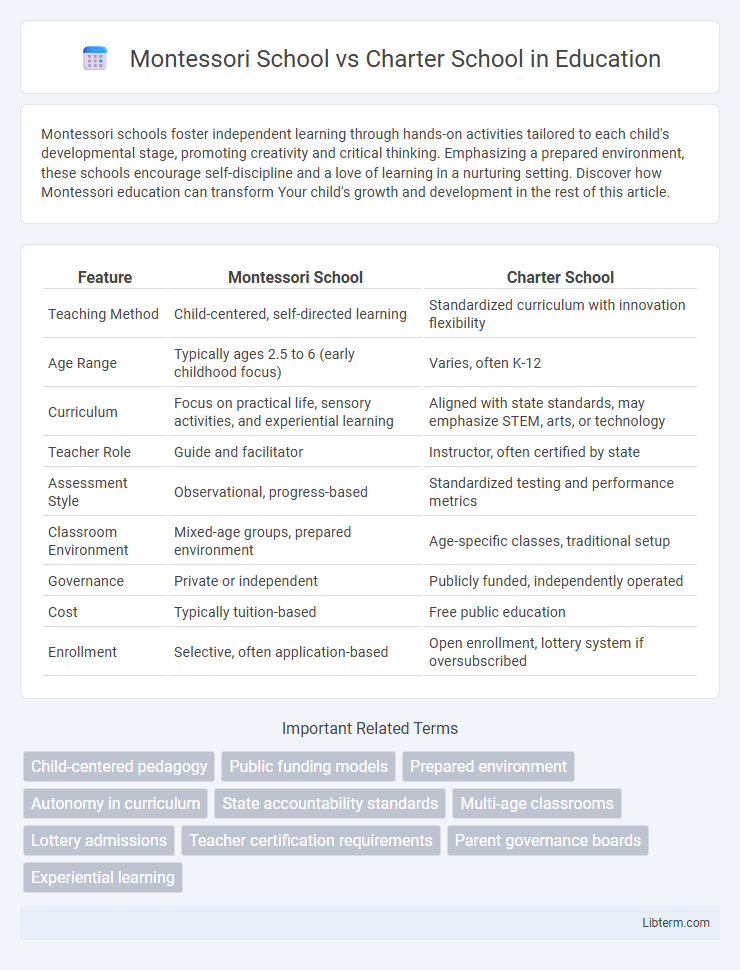Montessori schools foster independent learning through hands-on activities tailored to each child's developmental stage, promoting creativity and critical thinking. Emphasizing a prepared environment, these schools encourage self-discipline and a love of learning in a nurturing setting. Discover how Montessori education can transform Your child's growth and development in the rest of this article.
Table of Comparison
| Feature | Montessori School | Charter School |
|---|---|---|
| Teaching Method | Child-centered, self-directed learning | Standardized curriculum with innovation flexibility |
| Age Range | Typically ages 2.5 to 6 (early childhood focus) | Varies, often K-12 |
| Curriculum | Focus on practical life, sensory activities, and experiential learning | Aligned with state standards, may emphasize STEM, arts, or technology |
| Teacher Role | Guide and facilitator | Instructor, often certified by state |
| Assessment Style | Observational, progress-based | Standardized testing and performance metrics |
| Classroom Environment | Mixed-age groups, prepared environment | Age-specific classes, traditional setup |
| Governance | Private or independent | Publicly funded, independently operated |
| Cost | Typically tuition-based | Free public education |
| Enrollment | Selective, often application-based | Open enrollment, lottery system if oversubscribed |
Understanding Montessori Schools
Montessori schools emphasize child-centered education, allowing students to learn through hands-on activities and self-directed exploration within a prepared environment. Certified Montessori teachers guide individualized learning plans that foster independence, creativity, and critical thinking, differing from traditional or charter school curricula, which often follow standardized state requirements. These schools promote mixed-age classrooms, encouraging peer learning and collaboration, distinct from the more structured grade levels found in many charter schools.
What Are Charter Schools?
Charter schools are publicly funded independent schools that operate under a charter, allowing them greater flexibility in curriculum design and teaching methods compared to traditional public schools. They must adhere to state academic standards and are held accountable for student performance through regular evaluations. Families often choose charter schools for specialized programs, innovative instruction, and increased parental involvement opportunities.
Educational Philosophy and Teaching Approach
Montessori schools emphasize self-directed learning with mixed-age classrooms, fostering independence and hands-on exploration based on Dr. Maria Montessori's philosophy. Charter schools operate under public funding but follow varied educational approaches often designed to meet specific community needs or innovate traditional curricula. While Montessori education centers on individualized pacing and sensory activities, charter schools may integrate project-based learning, technology, or standards-aligned instruction tailored by their charter mission.
Curriculum Structure and Flexibility
Montessori schools utilize a child-centered curriculum emphasizing hands-on learning, self-paced progress, and mixed-age classrooms, fostering independence and creativity. Charter schools follow state-mandated curriculums with structured guidelines but often incorporate innovative teaching methods and greater flexibility in instructional approaches compared to traditional public schools. The Montessori model prioritizes individualized experiential learning, while charter schools balance standardized academic goals with adaptable educational practices to meet diverse student needs.
Classroom Environment and Student Interaction
Montessori schools feature a child-centered classroom environment with mixed-age groups and hands-on learning materials designed to foster independence and self-paced exploration. Charter schools typically offer a more structured classroom setting aligned with state standards, emphasizing teacher-led instruction and collaborative group activities to support academic achievement. Student interaction in Montessori settings is flexible and encourages peer learning across age groups, while charter schools promote cooperative learning through organized group projects and discussions.
Teacher Qualifications and Training
Montessori schools require teachers to obtain specialized Montessori certification, emphasizing hands-on learning and child-centered pedagogy, often from accredited institutions like AMI or AMS. Charter schools typically hire certified teachers who meet state licensure requirements but may vary in training focus, depending on school emphasis and curriculum. The distinction lies in Montessori educators' extensive training in specific Montessori methods versus charter school teachers' broader, state-standardized educational qualifications.
Enrollment Process and Admission Criteria
Montessori Schools typically require parents to schedule visits and participate in orientation sessions, emphasizing child readiness, age appropriateness, and alignment with Montessori philosophy during enrollment. Charter Schools often implement a lottery-based admission system when applications exceed available spots, prioritizing residency within the district and meeting specific academic or age criteria. Both school types may require documentation such as proof of residence, immunization records, and prior academic records but differ in their approach to assessing student fit and demand management.
Costs, Funding, and Accessibility
Montessori schools often require tuition fees that range from $5,000 to over $20,000 annually, funded primarily through private payments, limiting accessibility for lower-income families. Charter schools are publicly funded through government resources and typically free to attend, enhancing accessibility for diverse socioeconomic backgrounds. However, charter schools may have limited enrollment spots and often rely on competitive admissions or lotteries, affecting ease of access despite no tuition cost.
Academic Outcomes and Performance
Montessori schools emphasize individualized learning plans and hands-on activities, fostering creativity and critical thinking, which can lead to higher engagement and improved problem-solving skills. Charter schools often implement flexible curricula with an emphasis on standardized testing and measurable academic outcomes, frequently showing gains in test scores and graduation rates. Research indicates that while Montessori students excel in self-directed learning and social skills, charter schools may outperform in standardized assessments, highlighting distinct strengths in academic performance.
Choosing the Right School: Factors to Consider
Choosing the right school involves evaluating Montessori schools, which emphasize hands-on, student-led learning and individualized pacing, against charter schools that often offer specialized curricula and greater flexibility with public funding. Important factors include the child's learning style, need for structured versus self-directed education, teacher qualifications, class size, and the school's approach to social and emotional development. Assessing location, community involvement, and academic outcomes can further guide parents in selecting a school that aligns with their child's unique educational needs and family priorities.
Montessori School Infographic

 libterm.com
libterm.com